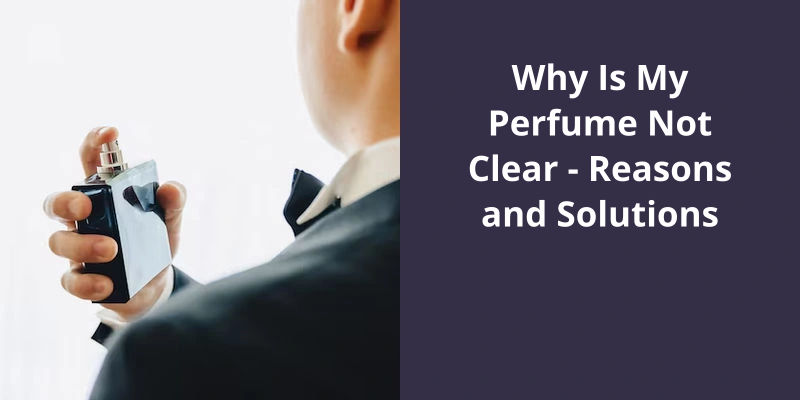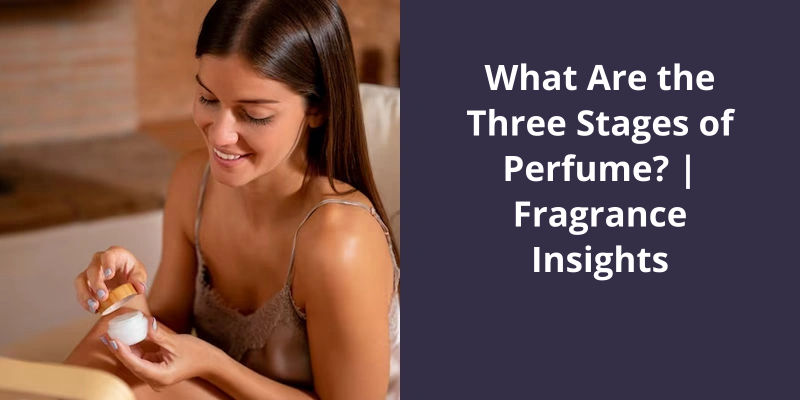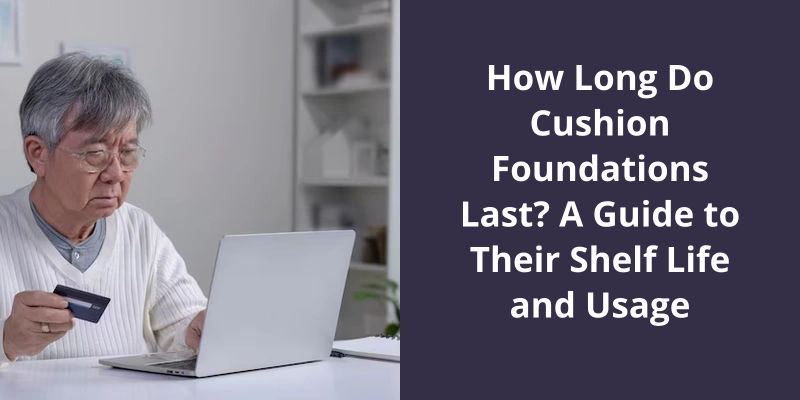The reason your perfume is not clear could be due to a number of factors. It could be due to its ingredients, for instance, some natural ingredients can cause cloudiness especially if they are oil-based. Additionally, changes in temperature might affect the clarity of your perfume as too much heat or cold can make it appear cloudy. If the perfume is expired or has been exposed to sunlight for a long period of time, this could also affect its clarity. To remedy this, it’s best to store perfumes in a cool, dark place away from direct sunlight to maintain their quality, and always make sure they’re within the expiration date. It’s also important to note that sometimes, cloudiness can be an intentional part of a perfume’s design. However, if you notice your perfume changing clarity suddenly, it’s sometimes a sign of it going bad especially if accompanied by a change in scent, so check the other aspects of the perfume too.

What Does It Mean When Perfume Gets Cloudy?
Perfumes are a wonderful way to enhance the natural scent of our bodies, leaving us feeling confident and attractive. However, over time, perfumes can start to lose their potency and even turn cloudy. This can be a sign that the perfume is oxidizing and that it may be time to replace it. When a perfume starts to lose it’s clarity, it’s a clear indication that something is wrong.
Cloudy perfume can be caused by a number of factors, such as exposure to air, heat, light, or moisture. Perfumes that come in clear bottles are especially susceptible to environmental factors, as they don’t offer as much protection as opaque bottles.
Heat and cold can both have an impact on the chemical composition of your fragrance, which leads to a change in the opacity of the liquid. This is why it’s essential to store your perfumes in a cool, dry place away from direct sunlight.
It’s also essential to keep in mind that fragrances have a limited shelf life. It’s best to dispose of it and start anew.
This can happen for various reasons, such as exposure to air, heat, light, or moisture. If you notice your fragrance has lost it’s color and clarity, it’s best to dispose of it and start anew. Remember that the best way to protect your perfume investment is to store it in a cool, dry place away from direct sunlight.
How to Properly Store Perfumes to Ensure Their Longevity and Potency
- Store perfumes in a cool, dry, and dark place.
- Avoid direct sunlight, heat, and humidity.
- Keep the perfume bottle tightly closed to prevent exposure to air.
- Store perfumes away from other strong-smelling products or chemicals.
- Avoid storing perfumes in areas with fluctuations in temperature and humidity, such as bathrooms or kitchens.
It’s a well-known fact that perfumes can last for years if kept in proper conditions. However, sometimes, even the most carefully stored perfume can go bad. One of the signs of an expired fragrance is a change in color. If you’ve noticed that your once-clear perfume has turned brown, you may be wondering if it’s still good. In this article, we’ll explore whether or not perfume is still safe to use if it changes color. But before we dive into that, let’s first understand why perfumes may change color in the first place.
Is Perfume Still Good if It Turns Brown?
This evaporation can cause your perfume to change color and potentially degrade it’s scent. Additionally, exposure to light and high heat can also expedite this evaporation process. This is why it’s important to store your fragrances in a cool, dark area.
If your perfume has turned brown and smells different than what youre used to, it’s likely expired. Expired perfumes can have a sour or stale scent, and may even cause irritation on the skin. It’s always best to dispose of old perfumes, as they may not only smell unpleasant but can also be harmful to your skin.
However, not all perfume discoloration is a sign of spoilage. Some natural ingredients and fragrances can darken over time and may not necessarily affect the quality of the scent. For example, vanilla-based fragrances may develop a more amber hue as they age.
To extend the life of your perfumes, consider investing in small travel-size bottles and decanting your favorite scents. This way, you can still enjoy your favorite fragrances without risking spoilage or degradation. Additionally, using perfumes in moderation can also help prolong their lifespan.
If youre unsure if your perfume has gone bad, give it a sniff test. If it smells off or unpleasant, it’s best to toss it. Overall, taking care of your perfumes can lead to a more enjoyable and long-lasting fragrance experience.
How to Properly Store Your Perfume to Prevent Spoilage
- Store perfume in a cool, dry place
- Avoid exposure to direct sunlight and heat
- Keep perfume bottles tightly closed when not in use
- Store perfume in it’s original packaging if possible
- Avoid storing perfume in humid areas such as bathrooms
- Don’t store perfume in the refrigerator or freezer
- Keep perfume away from sources of moisture and humidity
- Rotate the use of your perfume to prevent spoilage
Source: Does Perfume Expire? Find Out If Your Fragrance Has Gone …
As we continue to delve into the chemistry of perfume, it’s important to note that oxidation can have even more dramatic effects beyond just a change in color. Let’s take a closer look at what happens to perfume when it becomes too exposed to air and light.
What Happens When Perfume Oxidizes?
This acidity, in turn, causes the perfume to darken in colour. Aldehydes are one of the key components in perfumes, particularly in floral scents. They give the perfume a fresh, crisp scent, but also make it more prone to oxidation.
When perfume oxidizes, the fragrance changes too. In some cases, this change can be quite pleasant. For instance, a perfume might take on a deeper, more complex aroma, with notes that werent as noticeable before becoming more prominent. However, this isn’t always the case. In many instances, the fragrance will start to degrade, losing it’s complexity and becoming one-dimensional. This can be quite disappointing for those who invested in an expensive bottle of perfume.
There are several ways to slow down the process of perfume oxidation. One key method is to store the perfume properly. Perfumes should be kept in cool, dark places, such as a cabinet or drawer. It’s also a good idea to keep the perfume in it’s original packaging, to protect it from exposure to light and air. Additionally, it’s important to avoid exposing your perfume to extreme temperatures, such as in a car on a hot day.
How to Tell if Your Perfume Has Oxidized
Perfume can start to oxidize over time, which can change it’s scent and make it less effective. To tell if your perfume has oxidized, look for changes in color, consistency, and smell. The scent may become sour, musky, or musty, and the liquid may become cloudy, thick, or watery. If you notice any of these changes, it’s time to replace your perfume.
In addition to checking for changes in scent, the appearance of perfume can also provide clues about it’s quality. For example, if you notice that your perfume has turned yellow, it may be a sign that it’s undergone a chemical reaction known as oxidation. This can impact the fragrance’s longevity and potency, making it less effective over time. Despite this, there are still ways to salvage or repurpose an aging perfume, and seeking out a second opinion from a trusted confidant can be a helpful step in the process.
Is It Normal for Perfume to Turn Yellow?
Perfume is a popular fragrance that’s used by both men and women to enhance their body scent. While perfume may be a thing of beauty, it can be a little tricky to store and maintain. It can also be expensive, which is why people want to ensure that their perfume lasts as long as possible. One of the concerns that people have is when their perfume starts to turn yellow.
The good news is that there’s a clear and straightforward explanation for this phenomenon. When perfume is exposed to light and air, it can begin to oxidize. As a result, the appearance of the perfume can begin to change. This oxidation process can cause the perfume to become darker and even develop a yellow tint over time.
The perfume may still smell fantastic, but it’s vital to understand that it’s quality may have been compromised. Depending on the severity of the yellowing, it may be necessary to discard the perfume entirely. In some instances, old perfume can even start to emit an unpleasant or foul odor, which is a clear sign that it’s time to let it go.
To preserve the quality of your perfume, you may want to invest in a few storage solutions. Direct sunlight, heat, and humidity can accelerate the oxidation process, leading to the change in color. Additionally, you should avoid storing perfume in the bathroom as the moisture and humidity can negatively affect the fragrance.
As we learned, perfumes don’t expire in the same way that other products do. However, they do undergo some changes due to oxidation. Let’s take a closer look at what this means for your favorite fragrance.
Is Oxidized Perfume Bad?
Oxidation can cause changes in the chemical makeup of a perfume, which can affect it’s scent. In some cases, the smell can become stronger or harsher, while in other cases, it can become weaker or more muted. This might be because the top notes, which are responsible for a perfumes initial scent, may evaporate more quickly than the base notes, which are responsible for it’s overall aroma.
When perfume is exposed to light, heat, or air, it can also lead to the development of off-notes. These are unpleasant smells that aren’t part of the original fragrance and can make the perfume smell rancid or weird. If you notice any off-notes in your perfume, it may be an indication that it’s undergone oxidation and needs to be replaced.
If you want to extend the life of your fragrance, it’s important to store it properly. Keep your perfume away from light, heat, and humidity by storing it in a dark, cool place, such as a closet or dresser drawer. It’s also a good idea to keep it in the original packaging to protect it from exposure to the air.
It’s also important to be mindful of how you apply your perfume. Dont spray it directly onto your skin, as this can cause it to evaporate more quickly. Instead, spray it onto your clothes or pulse points, such as your wrists, neck, and behind your ears. This will help to prolong it’s scent and prevent it from oxidizing too quickly.
While perfumes don’t necessarily spoil like food, they can certainly go bad over time due to exposure to air, heat, and light. It’s important to store your perfume properly, be mindful of how you apply it, and replace it if you notice any changes in it’s color or scent. By taking these steps, you can enjoy your favorite fragrance for years to come.
How to Properly Test and Choose a Perfume
- Test perfumes on your skin, not just on paper strips
- Smell coffee beans or take breaks in between smelling different scents to reset your nose
- Consider the perfume’s longevity and how it changes over time
- Think about the occasion and time of day you’ll be wearing the perfume
- Don’t be afraid to ask for samples and try them out over a few days before making a decision
- Consider your personal scent preferences, such as floral or musky scents
- Take into account any potential allergies or sensitivities
- Read reviews and ask for recommendations from friends and experts
Conclusion
It could be due to a variety of factors such as incorrect proportions of ingredients, inadequate mixing or stirring, use of incompatible ingredients, or the presence of impurities and contaminants. It’s important to identify the root cause of the issue and take appropriate measures to rectify it. Seeking the advice of a professional perfumer, conducting quality control tests, or experimenting with different formulations may help you achieve the desired transparency and clarity in your perfume.





